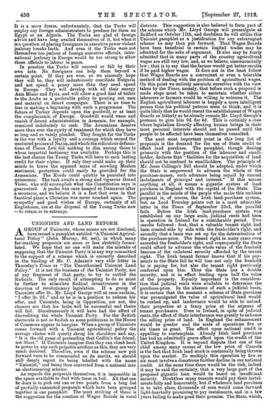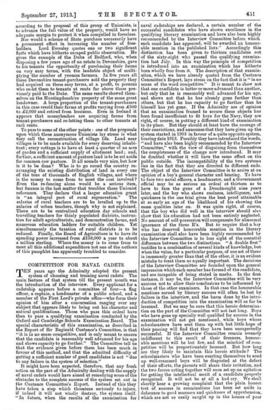UNIONISTS AND LAND REFORM. A GROUP of Unionists, whose names are
not disclosed, have issued a pamphlet entitled "A Unionist Agricul- tural Policy" (John Murray, 6d. net), in which many far-reaching proposals are more or less sketchily formu- lated. We hope that no one will make the mistake of supposing that the Unionist Party is in any way committed to the support of a scheme which is correctly described in the heading of Mr. C. Adeane's very able letter in Thursday's Times as "The Unauthorised Unionist Land Policy." it is not the business of the Unionist Party, nor of any fragment of that party, to try to outbid the Radicals. The only result of attempting to do so must be further to stimulate Radical inventiveness in the direction of revolutionary legislation. If a group of Unionists offer 2s., Mr. Lloyd George will at once exclaim, "I offer 2s. 6d.," and as he is in a position to redeem his offer, and Unionists, being in Opposition, are not, the chances are that his bribe will be successful and theirs will fail. Simultaneously it will have had the effect of discrediting the whole Unionist Party. For the British electorate is not so foolish as some politicians in the House of Commons appear to imagine. When a group of Unionists comes forward with a Unionist agricultural policy the average elector will quietly shrug his shoulders and say, "It is the old game of pretending that Codlin's the friend, not Short." If Unionists imagine that they can climb back to power by any such palpable artifices as this, they are very much deceived. Therefore, even if the scheme now put forward were to be commended on its merits, we should still deeply regret its being labelled with the name "Unionist," and being thus converted from a national into an electioneering scheme.
As regards the proposals themselves, it is impossible in the space available to deal with them in full. All that can be done is to pick out one or two points from a long list of partially connected proposals which have been grouped together in one pamphlet. The most striking of these is the suggestion for the creation of Wages Boards in rural districts. This suggestion is also believed to form part of the scheme which Mr. Lloyd George will promulgate at Bedford on October 11th, and doubtless he will utilize this Unionist pamphlet as a justification for any extravagant scheme he may then put forward. That Wages Boards have been beneficial in certain limited trades may be admitted for the sake of argument. It also may be freely admitted that in many parts of the country agricultural wages are still very low, and, as we believe, uneconomically low ; that is to say that the farmer would get better results if he paid higher wages. It does not in the least follow that Wages Boards are a convenient or even a tolerable method of dealing with the problem of agricultural wages. On this point we entirely associate ourselves with the view taken by the Times, namely, that before such a proposal is made steps must be taken to ascertain whether either labourers or farmers would be willing to welcome it. The English agricultural labourer is happily a more intelligent person than his political patrons seem to think, and it is quite likely that he would resent the establishment of Wages Boards as bitterly as he already resents Mr. Lloyd George's pretence to give him 9d. for 4d. This is certainly a case where legislation directly affecting human beings in their most personal interests should not be passed until the people to be affected have been themselves consulted.
The next most important point in this long list of proposals is the demand for the use of State credit to effect land purchase. The pamphlet, though dealing primarily with the position of the labourer and small- holder, declares that "facilities for the acquisition of land. should not be confined to smallholders. The principle of Mr. Jesse Collings's Bill should be adopted, under which the State is empowered to advance the whole of the purchase-money, such advances being repaid by annual instalments of principal and interest." If this means anything at all, it means a gigantic system of land purchase in England with the capital of the State. The parallel in the minds of the people who make this reckless proposal is, of course, the Irish land-purchase system, but, as Lord Eversley points out in a most admirable letter in the Times of September 23rd, the parallel fails. Before the Irish land-purchase system was established on any large scale, judicial rents had been in operation in Ireland for a considerable period. Two results followed : first, that a valuable tenant right had been created side by side with the freeholder's right, and secondly that a basis was set up for the determination of the purchase-price. The tenant right in many cases even exceeded the freeholder's right, and consequently the State could afford to advance the whole value of the freehold because of the collateral security afforded by the tenant right. The Irish tenant farmer knows that if his pay- ments to the State fail he will lose not only the freehold. he is paying for, but also the tenant right previously conferred upon him. Thus the State has a double security, and is in effect lending upon half the value of the property. Equally important is the considera- tion that judicial rents were available to determine the purchase-price. In the absence of such a judicial basis, it is certain that the moment a scheme of State purchase was promulgated the value of agricultural land would be rushed up, and landowners would be able to unload their properties at a fancy price at the expense of tenant purchasers. Even in Ireland, in spite of judicial rents, the effect of State interference was greatly to enhance the selling price of land. In England the enhancement would be greater and the scale of operations five or six times as great. The effect upon national credit is appalling to contemplate. Already Irish land purchase has had an admittedly grave effect upon the credit of the United Kingdom. It is beyond dispute that one of the chief among many causes of the low price of Consols is the fact that Irish land stock is continually being thrown upon the market. To multiply this operation by five or six must involve a disastrous further decline in our national credit. At the same time there would be the risk, indeed it may be said the certainty, that a very large part of the proposed gigantic loan would be based on insufficient security. Doubtless many tenants would pay their instal- ments fully and honourably, but if wholesale land purchase is to take place, thousands of men would come forward light-heartedly promising to pay instalments, and in a few years failing to make good their promise. The State, which, according to the proposal of this group of Unionists, is to advance the full value of the property, would have no adequate margin to protect it when compelled to foreclose. Nor would a scheme of State purchase necessarily have a permanent effect in increasing the number of free- holders. Lord Eversley quotes one or two significant facts which have hitherto escaped public observation. He gives the example of the Duke of Bedford, who, when disposing a few years ago of an estate in Devonshire, gave to his tenants the opportunity of purchasing their farms on very easy terms, with the laudable object of multi- Vying the number of yeoman farmers. In five years all these Devonshire tenant-purchasers sold the property they had acquired on these easy terms, at a profit, to persons who re-let them to tenants at rents far above those pre- viously paid to the Duke. The same results showed them- selves on the Huntingdonshire property of the same great landowner. A large proportion of the tenant-purchasers in this case resold their farms at profits varying from £500 to £2,000 and retired from business. Even in Ireland it appears that moneylenders are acquiring farms from tenant-purchasers and re-letting them to other tenants at rack rents.
To pass to some of the other points : one of the proposals upon which these anonymous Unionists lay stress is what they call the reconstruction of village life. Land near villages is to be made available for every deserving inhabi- tant; every cottage is to have at least a quarter of an acre of garden and a sufficient supply of allotment land ; and, further, a sufficient amount of pastureland is to be set aside for common cow pasture. It all sounds very nice, but how is it to be done ? Who is to go round the country re- arranging the existing distribution of land in every one of the tens of thousands of English villages, and where is the money to come from to meet the cost involved ? Even the re-fencing alone would be a serious item, but finance is the last matter that troubles these Unionist reformers. They declare that a larger education grant is "an integral part of rural regeneration." The salaries of rural teachers are to be levelled up to the salaries of urban teachers, though why is not explained. There are to be centralized education day schools and travelling teachers for thinly populated districts, instruc- tion for adult agriculturists, and demonstration farms, and numerous education ladders for suitable children. Yet simultaneously the taxation of rural districts is to be reduced. Finally, the Board of Agriculture is to have its spending power increased from £158,000 a year to about a million sterling. Where the money is to come from to meet all this additional expenditure not one of the authors of this pamphlet has apparently troubled to consider.











































 Previous page
Previous page